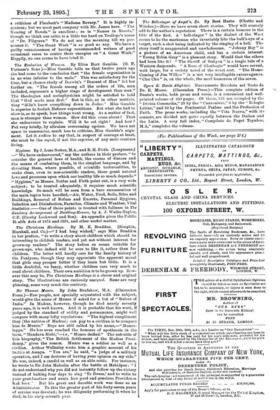Sir Thomas Munro. By John Bradshaw, MA. (Clarendon Press.)—Few people,
not specially acquainted with the subject, would give the name of Munro if asked for a list of "Rulers of India." In Madras, however, though he died nearly seventy years ago, it is well known. And it is probable that his work, if judged by the standard of utility and permanence, might well compare with many lofty reputations. "The highest compliment they [the natives of Madras] can pay to a civilian is to compare him to Munro." Boys are still called by his name,—" Munro lappa." He has even reached the honours of apotheosis in the term, " Itlandava Rishi,"—i.e., "Munro deified." The sub-title of this biography, "The British Settlement of the Madras Presi- dency," gives the reason. Munro was a soldier as well as a civilian. Arthur Wellesley wrote him a graphic account of his tactics at Assay°. "You are," he said, "a judge of a military operation, and I am desirous of having your opinion on my aide." He was, indeed, a candid as well as an able critic. For instance, he wrote to Sir John Malcolm after the battle at Mehidpur "I do not understand why you did not instantly follow up the victory instead of halting four days to sing • Te Deum,' and to write to your grandmother and aunts how good and gracious Providence had bees " But his great and durable work was done as an Administrat-or. To this the greater part of his forty-seven years of service was devoted; he was diligently performing it when he died, in his sixty-seventh year.


































 Previous page
Previous page